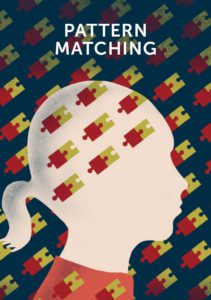Mental health and long COVID: a pattern matching story
I wonder if many of us ever think about how we get through all the tasks and activities we do each day. Daily life is often full of things to do that don’t require much thought, like getting out of bed and dressing, or making packed lunches and getting the kids to school. And, if we have been settled in our jobs for some time, we often find we can carry out many parts of our jobs without feeling too much strain.
What if all these things we are used to doing day-to-day suddenly became exhausting, painful, or confusing? What if tasks we thought were simple, like getting dressed, suddenly made us feel like we had climbed a mountain? If this were to happen, we might have some idea as to what life is like for someone living with symptoms of Long COVID.
In this blog, we take a closer look at mental health and Long COVID, and how we can utilise the Emotional Needs & Resources approach to manage Long COVID symptoms.
We are born with natural resources we use to meet our emotional needs. These resources include our emotions, which guide us towards things that help meet our needs and away from things that don’t. There’s also our imagination resource, which helps us to plan how to meet our needs, and to be creative and innovative in an ever-changing world.
Pattern matching is another of our natural resources. It allows us to go about daily activities without having to think too hard about them – it’s one of our brain’s energy-saving tools. Imagine how exhausted we would be if we had to think about how to use every chair we encountered, because it was a different shape or design from the last chair we had been using! So, our brain builds useful patterns that we can use in different situations to help us avoid using too much energy on everyday activities. This helps us to focus on different things that need our attention during a day and allows us to pace ourselves.
Most of us don’t notice how much we rely on pattern matching. However, if we become unwell with a condition like Long COVID, we can suddenly find our usual patterns no longer work for us. This can be challenging, especially when we have so many competing demands on our time and bodies.
A lot of the things we do every day, like work, caring for family, cooking healthy meals, or having fun with friends help us to meet our emotional needs. If a person can meet their emotional needs in a balance that works for them, they tend to have better mental health. However, being unable to meet our emotional needs in the ways we are used to can lead to us experiencing more stress, anxious thoughts, or a low mood.
Mental health and COVID: Jurrah’s experience
Since the arrival of COVID, many of us have either been unwell with the virus or know someone who has. Some of us might even know people who have developed Long COVID – people like Jurrah.
Jurrah was working as a nurse. He enjoyed socialising with colleagues and friends, took part in parkruns and felt in control of his life. Things changed significantly after being unwell with COVID.
He still had symptoms several months after recovering from the original infection. Jurrah struggled with pain, breathlessness, and fatigue. Needing to return to work, Jurrah put his attention and physical effort on doing his job at the same pace he always had. He felt unable able to give attention to friends and could no longer manage the physical activity he used to enjoy. In short, his usual patterns weren’t working for him anymore.
To begin with, Jurrah was frustrated and confused. He wondered why he wasn’t recovering in the way he expected and questioned whether he would ever be able to go back to doing the things he used to. It was difficult to follow the advice he had been given to ‘pace himself’ as he was unsure as to what would or wouldn’t negatively affect his symptoms, and some aspects of his life felt non-negotiable.
When our brain has built up a strong pattern for something, we can do it without having to think much. To begin with, Jurrah’s brain hadn’t built up the information needed to create new patterns for his daily activities that included managing his symptoms. As time moved on, Jurrah began to experiment with ways to meet his needs in a more balanced way. He wanted to reconnect with friends without it having a negative effect on his symptoms, so he set himself flexible goals.
So, on days he felt less unwell, he would arrange to meet a friend to chat or go for a short walk. On days his symptoms were affecting him more, he would call or text a friend. This allowed him to meet his need for emotional connection and attention in a way that worked for him.
Previously, Jurrah had been used to doing day to day tasks independently. He began asking for help with some tasks and sought advice about how he might adjust his working pattern in a way that worked for both him and his employer. He started practicing relaxation techniques like 7/11 breathing before going to bed, to help his brain and body wind down ready for sleep.
Over time, Jurrah’s brain began to build new patterns for doing things. These new patterns helped to conserve energy. While making these changes didn’t remove uncertainty about how long he would have symptoms for, he did feel more in control of his life, and he was able to meet his emotional needs in a way that worked well enough for him while he was on his road to recovery.
Pattern Matching is one of 9 resources we can use to support our mental health
How creating new patterns can support your mental health
Creating new patterns for meeting emotional needs can positively affect our mental health as we know that meeting our needs in a balance that works for us helps us to stay emotionally well. On days we feel better, we might be tempted to do lots of things, because we don’t want to miss out, or we feel we should do more things rather than leave tasks to another day or allow someone else to help. Some people find this can lead to a flare up in symptoms.
When building a new pattern for meeting needs, it can be useful to remember the Ancient Greek myth of Daedalus and his son, Icarus. You will probably remember being told the story at school and learning all about Icarus forgetting his father’s advice to avoid flying too close to the sun. Icarus became too excited by the novelty of being able to fly and kept soaring higher and higher – because he could. This led to the wax used to hold the wings together melting and poor Icarus plunging to the ground. It’s also useful to know that Daedalus also told his son not to fly too low and close to the sea, or the splashing waves would damage the wings. He advised his son to fly in the space in between the highest and lowest points.
Using the message in this story can help us think about helpful ways to build new patterns. We want to avoid patterns which lead to us crashing from doing too much or sinking because we feel we aren’t doing enough to have a satisfying life. We want to build a pattern that understands the steady space between us on our best days and us on our worst days. Sometimes we will be able to fly slightly higher, sometimes slightly lower – depending on how our symptoms are affecting us. Helping our brain build a new pattern will conserve our energy and, over time, we will be able to gradually build new things in, while meeting our needs in the steady zone.
Try goal setting
Setting ourselves positive, achievable goals which meet our emotional needs is useful. It meets our need for achievement and gives us a feeling of meaning and purpose. Our brain will also reward us for doing this. When we learn new skills and overcome challenges, our brain rewards us with feelings of pleasure by releasing chemicals calls endorphins. Our brain also releases a chemical called dopamine, which is designed to encourage us to seek new skills, experiences, and activities. This can help us to keep finding new ways to meet needs. It will also encourage us to add new activities when we have mastered the ones we initially set ourselves.
Storm felt as though they had never recovered from COVID. Their symptoms changed from a constant cough and breathing problems to nerve pain and brain fog. They were a musician, but found it hard to focus on even just listening to music let alone playing their guitar, so hadn’t written any new songs for months. Feeling as though they had lost their purpose, Storm stopped meeting up with fellow musicians and felt increasingly isolated and worried about their future.
Practicing the skill of 7/11 breathing helped Storm to feel more in control of their anxiety. They also found it helped to ease their breathlessness. Feeling more in control helped Storm to think more clearly. They spoke to a musician friend about practicing singing exercises online, which helped Storm to feel reconnected to people and music again. Beginning to experiment with new ways to meet emotional needs helped to reduce the anxious thoughts Storm had been having and helped their brain to begin building a new pattern for meeting emotional needs in the future.
Conclusion
It’s common to come up against challenges in life that mean our usual patterns stop working for us. Being aware of our natural pattern matching resource can help us to understand why we find sudden changes so difficult. It can also help us to know that should we encounter something as life changing as Long COVID, it is possible to build new patterns to meet emotional needs and support our mental health.
I wonder how many of us will now become more aware of the patterns we follow in our everyday lives. Perhaps we will start to think about which patterns are helping us and if any patterns currently hold us back. Maybe we will think about adjusting our patterns to support someone else. I invite us all to become curious about our patterns and to celebrate the usefulness of this natural resource we have within us to support mental health and Long COVID, and mental health overall
Further support
Suffolk Mind can provide Long COVID support for those registered with SNELCAS. Find out more on our support service page.
Please note: the experiences mentioned here are fictional examples based on real-life stories gathered through research.












